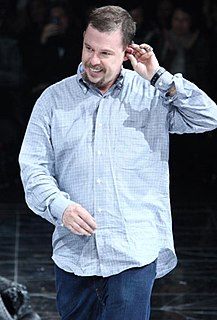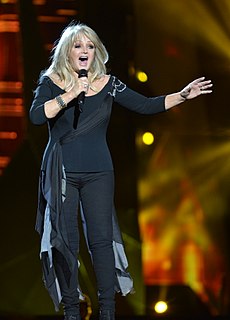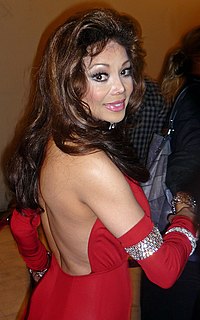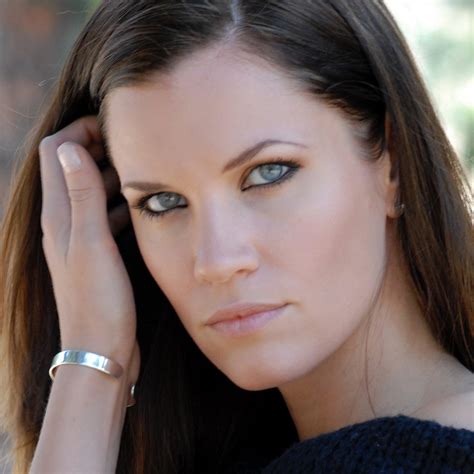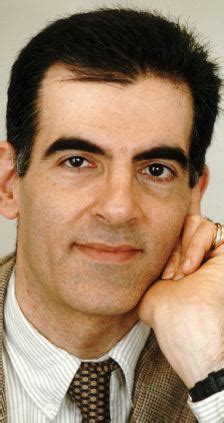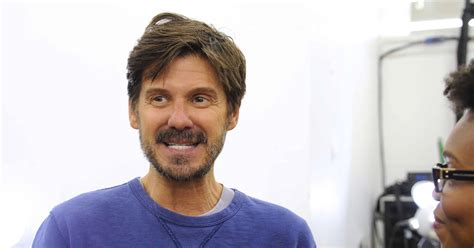Top 934 Naive Quotes & Sayings - Page 15
Explore popular Naive quotes.
Last updated on April 16, 2025.
I hear my father-in-law's response..."Naïve, dreaming Adam. He who would do battle with the many-headed hydra of human nature must pay a world of pain & his family must pay it along with him! & only as you gasp your dying breath shall you understand, your life amounted to no more than one drop in a limitless ocean!" Yet what is any ocean but a multitude of drops?
It is prima facie highly implausible that life as we know it is the result of a sequence of physical accidents together with the mechanism of natural selection. We are supposed to abandon this naïve response, not in favor of a fully worked out physical/chemical explanation but in favor of an alternative that is really a schema for explanation, supported by some examples. What is lacking, to my knowledge, is a credible argument that the story has a nonnegligible probability of being true.
To show mercy is not naïve. To hold out against the end of hope is not stupidity or madness. It is fundamentally human. Of course... We are all doomed; we are all poisoned from our birth by the rot of stars. That does not mean we should succumb...to the seductive fallacy of despair, the dark tide that would drown us. You may think I'm stupid, you may call me a madman and a fool, but at least I stand upright in a fallen world.
Our goal is to desperately make the best products we can. We're not naive. We trust that if we're successful and we make good products, that people will like them. And we trust that if people like them, they'll buy them. And we figured out the operation and we're effective. We know what we're doing, so we'll make money, but it's a consequence.
When you start to meet with ordinary people you understand that a Russian person, really any person from Russia, a Tatar, a Mordvin, a Chechen, a Dagestani, they are very open people, even a little naive. But there's one defining trait that probably all peoples have, although it comes out especially strongly in us. That's a drive toward fairness. It's one of the dominating, I think, traits in the mentality of a person from Russia, a Russian person.
Destiny, quite often, is a determined parent. Mozart was hardly some naive prodigy who sat down at the keyboard and, with God whispering in his ears, let music flow from his fingertips. It's a nice image for selling tickets to movies, but whether or not God has kissed your brow, you still have to work. Without learning and preparation, you won't know how to harness the power of that kiss.
I don't try to do anything. I think the moment that I'm like, "Oh, I have to be this way or that way" is the moment that I become sad, or maybe an asshole. So I just try to be myself and put out what is most natural. But I think I am - I mean, I've seen a lot, been through a lot. But something remains sort of naïve within me. And I just try to nurture that.
I would answer with the words of the Stasi alumnus Wolfgang Schmidt, who was asked that question: "What about these Americans who say, I have nothing to hide?" And he said, and I quote: "This is very naïve. This is the reason that the government collects the information in the first place to use against you. The only way to prevent that is to prevent the information from being collected in the first place." End quote.
I was this young boy and I saw this man with his hands round my sister's neck, I was just standing there with her two children beside me... Everything I've done since then was for the purpose of making women look stronger, not naïve. And so, when everyone started saying I was a misogynist, that really freaked me out. They didn't know me. They didn't know what I had seen in my life. That was the first part of fashion that I hated - people labeling me without knowing me.
Your assumptions about the lives of others are in direct relation to your naïve pomposity. Many people you believe to be rich are not rich. Many people you think have it easy worked hard for what they got. Many people who seem to be gliding right along have suffered and are suffering. Many people who appear to you to be old and stupidly saddled down with kids and cars and houses were once every bit as hip and pompous as you.
Sometimes I think some of my fellow novelists who have not worked in television and film are very naive about this process. They get an offer and there's the dump truck full of money and they sign it, they cash the check and then they're not involved in the series. They may get invited to the premiere and they come out of the premiere looking like all of their children had just been gassed, with a stunned look on their face because everything has been changed.
Alzheimer's is a horrible thing. Some people are naive about it. They think, 'Oh it's just your memory,' but my mother was in terrible pain. Your body closes down. She didn't know if she'd eaten or if she wanted to eat. She couldn't remember how to walk. Towards the end, she didn't know us. It came gradually, then it got worse.
The sentiment that is very inappropriately named equality is fresh, strong, alert, precisely because it is not, in fact, a sentiment of equality and is not related to any abstraction, as a few naive "intellectuals" still believe; but because it is related to the direct interests of individuals who are bent on escaping certain inequalities not in their favour, and setting up new inequalities that will be in their favour, this latter being their chief concern.
I would not have majored in English and gone on to teach literature had I not been able to construct a counterargument about the truthfulness of fiction; still, as writers turn away from the industrious villages of George Eliot and Thomas Hardy, I learn less and less from them that helps me to ponder my life. In time, I found myself agreeing with the course evaluations written by my testier freshman students:'All the literature we read this term was depressing.' How naive. How sane.
I have to work hard and wear pants. I've worked really hard these last years, and since everything is coming together at the same time, I had to move the play back. I'm kind of in love with my theater agent. I'm a true naïve about the theater, a total innocent. He says to me, have you ever been to a rehearsal room? Do you realize you are opening at the Public in New York? You do understand that the audience will be New York theater people?
On many occasions in the late 1950s and 1960s, [Ho Chi Minh's] ideas were apparently ignored by those who felt that his approach was too naive and prone to compromise. The outbreak of open warfare with the French and later with the United States was in effect a sign of the failure of Ho Chi Minh to achieve his objective to fight and win at low cost.
There is rarely a creative man who does not have to pay a high price for the divine spark of his greatest gifts... the human element is frequently bled for the benefit of the creative element and to such an extent that it even brings out the bad qualities, as for instance, ruthless, naive egoism (so-called "auto-eroticism"), vanity, all kinds of vices-and all this in order to bring to the human I at least some life-strength, since otherwise it would perish of sheer inanition.
There's a lesson to be learned out of everything we go through in life. I recall when I left [Jack Gordon], and my mother was so upset. "How could you allow him to beat you? You should really be upset with him." And I said, "Mother, I can't be." She goes, "Why?" I said, "Because I can't harbor hatred in my heart." I was extremely religious and extremely naïve. God took me through that for a reason, for me to learn the outcome.
There are a variety of reasons. Not all Western leaders are equal. We have to make a certain separation from naïve Americans and Europeans. These are two different categories. For the Europeans, it affects the image of the "New Europe." The false image of Europe is that it is peaceful, separate from the past. Now the image of the New Europe is a radically false image.
Let me go back to a comfortable analogy for me - sports... basketball. I use it because you're naive if you don't see the national full-court press picking away right now: A good point guard drives through a full court press, protecting the ball, keeping her eye on the basket... and she knows exactly when to pass the ball so that the team can WIN.
Maybe I'm naive, but I still have a little bit of faith in the structure of the United States government and thinking that one man can't ruin everything. I don't know if it's just because I'm hopeful or cynical, but I just don't think one man can change everything. It's just like I didn't think Obama could save the country by himself. I don't think Trump can ruin the country all by himself. I don't know. I hope I'm right.
I find with most of my readers are kind of like me, sort of people who were a little bit naive in life and then learned the hard way that this is what's going on, the political games and most of my readers write to me telling me that the book helped them open their eyes to what other people are doing to them.
How unbelievably naive we both were that night. We clung hard to each other, making vows we couldn't keep and should never have spoken aloud. That's how love is sometimes. I already loved him more than I'd ever loved anything or anyone. I knew he needed me absolutely, and I wanted him to go on needing me forever.
I am a writer and my faith in the world of art is intense, but not irrational, nor naïve - because art takes us and makes us take a journey beyond price, beyond cost, into bearing witness to the world as it is and as it should be. Art invites us to know beauty and to solicit it, summon it, from even the most tragic of circumstances.
I have respect for mother nature's methods of robustness (billions of years allow most of what is fragile to break); classical thought is more robust (in its respect for the unknown, the epistemic humility) than the modern post-Enlightenment naïve pseudoscientific autism. Thus my classical values make me advocate the triplet of erudition, elegance, and courage; against modernity's phoniness, nerdiness and philistinism
After the last screening [of "Selling Isobel" ] an 18-year-old girl came up to me and said, "Oh my God, I'm so naïve." I said, "No, you're not, you're just young." And she's so grateful for having seen it, because she's an actress and from now on she's going to take a friend with her to auditions and let her mom know exactly where she's going. That's a job done right there.
I was trying to make them face their fears. Youth spends so much energy trying to forget them. There's the fear of failure in examinations, fear of sex, fear of not getting a job, fear of unpopularity, fear of appearing naïve. Youth discovers many bunkholes in which to hide when frightened. They are mostly unhealthy, none of them bombproof.
In the campaign back in 2007, 2008, people would say, "Oh, he's being naïve. He thinks that there's no red states and blue states. And wait 'til he gets here." And I will confess that, I didn't fully appreciate the ways in which individual senators or members of Congress now are pushed to the extremes by their voter bases. I did not expect, particularly in the midst of crisis, just how severe that partisanship would be.
Mind you, Mount Rushmore isn't exactly the Parthenon or the Sistine Chapel either. After the naïve daftness of the Crazy Horse monument, I find the pompous idiocy of those four presidents somehow more risible still. Wishing to show respect or feel a vicarious thrill of admiration and pride, I can only giggle. For which I am very sorry. Any loyal American reading this who feels outraged and insulted is free to explode with derisive snorts of laughter at any British equivalent.
Guinevere has been done quite a few times, especially as a mature young woman, who either is the damsel in distress or the warrior, strong-willed woman. Chris wanted a variety of things in this Guinevere. He predominately wanted her to be real and natural, and make mistakes and be passionate, and be the feisty young girl, but then also completely naive, innocent and ignorant, at the same time.
It is naive to believe that a steady diet of blatant immorality, played out nightly in our living rooms, has no effect on people. I am always curious when individuals insist that what they watch on television or in movie theaters doesn't affect them. ... Are we really to believe that hours, leading to years, of television viewing will not affect attitudes about everything from family life to appropriate sexual relations?
I didn't see films when I was young. I was stupid and naïve. Maybe I wouldn't have made films if I had seen lots of others; maybe it would have stopped me. I started totally free and crazy and innocent. Now I've seen many films, and many beautiful films. And I try to keep a certain level of quality of my films. I don't do commercials, I don't do films pre-prepared by other people, I don't do star system. So I do my own little thing.
Indeed, the only truly serious questions are ones that even a child can formulate. Only the most naive of questions are truly serious. They are the questions with no answers. A question with no answer is a barrier that cannot be breached. In other words, it is questions with no answers that set the limit of human possibilities, describe the boundaries of human existence.
I reveled in the smallness, the coziness of an upstairs bedroom in a traditional American Cape Cod house the half-floor that forces you to duck, to feel small and naive again, ready for anything, dying for love, your body a chimney filled with odd, black smoke. These square, squat, awkward rooms are like a fifty-square-foot paean to teenage-hood, to ripeness, to the first and last taste of youth.
Kissinger projects a strong impression of a man at home in the world and on top of his brief. But there are a number of occasions when it suits him to pose as a sort of Candide: naive, and ill-prepared for and easily unhorsed by events. No doubt this pose costs him something in point of self-esteem. It is a pose, furthermore, which he often adopts at precisely the time when the record shows him to be knowledgeable, and when knowledge or foreknowledge would also confront him with charges of responsibility or complicity.
The notion that a radical is one who hates his country is naïve and usually idiotic. He is, more likely, one who likes his country more than the rest of us, and is thus more disturbed than the rest of us when he sees it debauched. He is not a bad citizen turning to crime; he is a good citizen driven to despair.
Will's face turned grave. "Be careful with it, though. It's six hundred years old and the only copy of its kind. Losing or damaging it is punishable by death under the Law." Tessa thrust the book away from her as if it were on fire. "You can't be serious." "You're right. I'm not." Will leapt down from the ladder and landed lightly in front of her. "You do believe everything I say, though, don't you? Do I seem unusually trustworthy to you, or are you just a naive sort?
I hope that I state your case fairly: One of my great fears is misrepresenting you, even to myself, now that you are not here to set me right. The truth is that you did not believe in idealism. All love was suspect; even a saint's was just differed self-interest. And it was impossible to argue without sounding either sentimental or naive. Cynicism has all the smart words on it's side; idealism uses a nursery school dictionary. And you studied early to disguise your childhood pain. But it is not universal.
I don't really date. I have a weird vision of relationships because my parents have known each other since second grade, and they got married right out of college. I've always thought that's what it's supposed to be like, and if it's not, then I don't want to waste my time on it. Even when I was 14, I was like, 'I'm not gonna marry this person. What's the point of doing it?' It's not me being naive. I just know what it's supposed to be like, and I think until I feel that, I cannot be bothered.
There is one great truth in western politics that I have been able to see, and that is this: The more left wing your political ideals are, the more naive a person you are likely to be. The more right wing your political ideals are, the more evil a person you are likely to be. Choosing a political standpoint is largely a matter of deciding which failure as a human you are more comfortable with.
When you decide 'to be a writer,' you don't have the faintest idea of what the work is like. When you begin, you write spontaneously out of your limited experience of both the unwritten world and the written world. You're full of naïve exuberance. 'I am a writer!' Rather like the excitement of 'I have a lover!' But working at it nearly every day for fifty years ? whether it is being the writer or being the lover ? turns out to be an extremely taxing job and hardly the pleasantest of human activities.
People were touchingly naive at the dawn of the Internet revolution when they said the Internet will route around censorship the way it routes around damage. With any revolution, the establishment catches up and figures out how to screw it up. The answer is to keep technology advancing fast enough so that those who would try to control it can't. It's up to people to defend what they care about. We shouldn't be complacent that this stuff is going to be a force for good.
The reality is that most celebrity defendants are extremely unknowledgeable, naive and vulnerable, and if they get into trouble they usually call their lawyer friends who handle criminal cases. And if they do not know any, they call their business lawyers, who then refer them to lawyer friends of theirs who handle criminal cases. It's very incestuous.
I'm not naive, I know that bad things happen, but most people do the right thing most of the time. Most people wake up and they try to do what's right for their relationships, whether it's marriage or family. They try to do what's right for their job. They try to make a better world for those around them, and that's what I want to write about.
I'm not naive. Sometimes interpretation is more of an art than a science. There are those who would label interpretation absolutely anything a judge might do or, two, the text of a statute or the Constitution. But it seems to me there comes a point where a judge is using his own creativity and purpose and crosses the line between interpreting a text written by somebody else and in a sense creating something new.
I think we can't be naive in dealing with the Russians or dealing with the Syrians. But at the same time, I think we could try to encourage - and I think this is what diplomacy should do - encourage the self-interests of all parties to believe that it is in their best interest to get evil actors or rogue actors such as Syria or Iran, if you try to have less belligerent and less bellicose behavior.
I didn't know I wanted to be a hairdresser. I was always interested in fashion and imagery in a very naive way, but it was always an attraction, like glitter balls. This was in the late '70s, early '80s, so it wasn't like today, where you kind of know all about the industry. Fashion was a very insider industry then - it was very closed. So I didn't really know what I wanted to do.
I've had a chance to meet some of my civil rights heroes and, more recently, members of the young generation around [Barack] Obama, people in their teens and twenties who were determined to make history and who were too idealistic to think that what they were trying to do might be impossible. They proved that visionary pragmatism can win over the majority. That comes from a particular place in your heart that generation Y is offering America. They just can't afford to be naive now, in terms of the ferocity of the opposition.
This, she thought, isn’t just for today. It’s for everything. For the heartache that still felt like a punch in the gut each time it struck, fresh as new, at unpredictable moments; for the smiling lies and the mental images she couldn’t shake; for the shame of having been so naive. For the way loneliness is worse when you return to it after a reprieve—like the soul’s version of putting on a wet bathing suit, clammy and miserable.
Justice is always naive and self-confident; believing that it will immediately win once recognized. That is the reason why the forces of Justice are so poorly organized. On the other hand, the Evil is cynic, sly and fantastically organized. It never ever has the illusion of the ability to stand on its own feet and to win in a fair competition. That is why it is ready to use any kind of means without hesitation. And of course it does - under the banners of the most noble ideas.
All the utopianism of the early days of the Internet seems to have dissipated. But I don't want us to lose that utopianism altogether, even if it was naïve and ill-informed and sometimes silly. Rather I want us to ask about the obstacles that are preventing the good stuff from coming to fruition. Let's investigate and think about creating something worthwhile instead of assuming that there is an inevitable track of increased centralization, consolidation, and commercialization that we can't do anything about.
It would be naïve to suggest the Iranian regime will not continue to use its nuclear program, and any economic relief, to further destabilize the region, in the weeks ahead, Republicans and Democrats in Congress will continue to press the Obama administration on the details of these parameters and the tough questions that remain unanswered. We will stand strong on behalf of the American people and everyone in the Middle East who values freedom, security, and peace.
The idea that a book can advise a woman how to capture a man is touchingly naive. Books advising men how to capture a woman are far less common, perhaps because few men are willing to admit to such a difficulty. For both sexes, I recommend a good novel, offering scenarios you might learn from, if only because they reflect a lot of doubt.
There are only four U.S. tournaments that the very best players in the world play every year - Palm Springs, Miami, Cincinnati, and the U.S. Open. So how would golf or NFL or NHL fare if there were only four times a year that their very best were visible? Tennis went international, and for us to expect it to be popular media-wise is very naïve. And that translates into children and families being interested.
In the social equation, the value of a single life is nil; in the cosmic equation, it is infinite... Not only communism, but any political movement which implicitly relies on purely utilitarian ethics, must become a victim to the same fatal error. It is a fallacy as naïve as a mathematical teaser, and yet its consequences lead straight to Goya's Disasters, to the reign of the guillotine, the torture chambers of the Inquisition, or the cellars of the Lubianka.
Moving parts in rubbing contact require lubrication to avoid excessive wear. Honorifics and formal politeness provide lubrication where people rub together. Often the very young, the untravelled, the naive, the sophisticated deplore these formalities as 'empty,' 'meaningless,' or 'dishonest,' and scorn to use them. No matter how 'pure' their motives, they thereby throw sand into machinery that does not work too well at best.
There are more stars known to exist right now than the total number of all the grains of sand on every beach in the entire world. With those kinds of odds, it would seem downright naive for someone to go to a beach in, say, some out-of-the-way inlet in Baffin Bay, stoop to pick up only one tiny grain of sand, and declare that that grain alone was the only place where life could exist.
Some people continue to defend trickle-down theories which assume that economic growth, encouraged by a free market, will inevitably succeed in bringing about greater justice and inclusiveness in the world. This opinion, which has never been confirmed by the facts, expresses a crude and naive trust in the goodness of those wielding economic power and in the sacralized workings of the prevailing economic system.
It is clear, then, that the idea of a fixed method, or of a fixed theory of rationality, rests on too naive a view of man and his social surroundings. To those who look at the rich material provided by history, and who are not intent on impoverishing it in order to please their lower instincts, their craving for intellectual security in the form of clarity, precision, "objectivity," "truth," it will become clear that there is only one principle that can be defended under all circumstances and in all stages of human development. It is the principle: anything goes.








